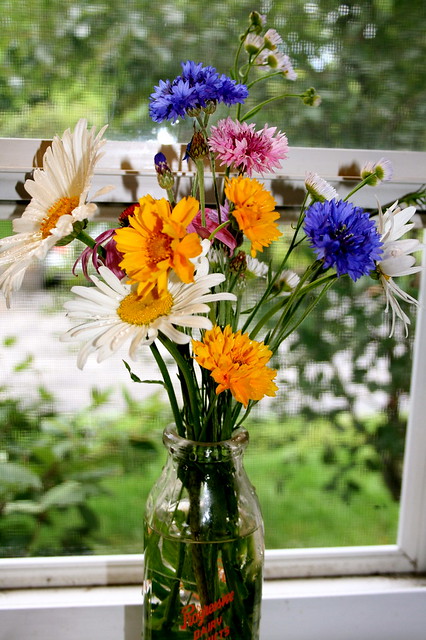
Friday was a good mail day. Mother Earth News is my favorite magazine. I knew it was coming, there had been article snippets, teasing me on Facebook for the last couple of weeks, and Friday it arrived. Last night as I was reading, I had a blog post taking shape in my mind, then I came across an article titled "Wabi-Sabi Finding the Beauty and Peace in Ordinary Things" and scrapped my thoughts for the post. I wanted to link to the article, but it's one of the ones in the issue unavailable on-line.
Wabi-Sabi is appreciating the balance and beauty in the imperfect. Accepting the cycle of life in ordinary objects and finding use and purpose for them in our daily lives. It is closely tied to Zen Buddhism and the Japanese Way of Tea.
I am not saying that I would go to the
A part of the article was a box that gave 12 tips toward achieving Wabi-Sabi. It is more than about just the appreciation and re-use of possessions, it is a basis for achieving simplicity in a very non-simple world and cultivating a more sustainable life. Since the article is locked out, I'm going to type those tips in :)
Taken from Mother Earth News February/March 2011
1. Cultivate Slowness. Rebel against the machines. Hand a towel to a loved one and ask him or her to dry dishes while you rinse. Take 10 minutes to sweep the floor with a real broomcorn broom rather than filling your space with the roar of a vacuum.
2. Cultivate Vision. Start with the container you use to hold your morning beverage. Treat yourself to pottery that feels solid and heavy in your hand. Admire your mug's shape, textures and colors every morning to strengthen your ability to find beauty in the rest of the day.
3. Cultivate Craft. Making and growing things yourself is a gentle rebellion against globalized mass production. Spinning wool, making pottery and weaving baskets provides a tactile meditation almost impossible to experience by any other means.
4. Cultivate Cleanliness. An ancient tea master described wabi-sabi as "putting one's whole heart to cleaning and repeating it several times." Every time we sweep, dust or wash, we're creating clean, sacred place.
5. Cultivate Solitude. Find a space in the attic or a spare bedroom that you can dedicate to solitude and meditation. In tight quarters, designate a quiet corner in your bedroom or even living room as your meditation space.
6. Cultivate Space. Clutter smudges clarity, physically and psychologically. In wabi-sabi, space and light are the most desirable ornaments.
7. Cultivate Silence. To cultivate the Quakers call the "still, small voice within," slowly reduce the noise sources in your life. Less is more.
~Leave the television off for one night each week.
~Turn off the radio during your morning or evening commute.
~Practice a few moments of silence before eating a shared meal.
~Make time in the afternoon for a quiet cup of tea.
8. Cultivate Sabi (the beauty that comes with age). Antique doorknobs and radiator grates give your home soul. Building with salvaged materials gives a new house depth and history it couldn't otherwise have.
9. Cultivate Soul. A piece made by hand holds the steady, solid vibrations of its maker rather than those of the jarring, impersonal machine. Surrounding yourself with things made by real people invites a tiny piece of each craftsman into your space.
10. Cultivate Imperfection. Real people leave mail piled in the entry, let the flowers go a little too long in the vase (if they have them at all), allow the dog on the bed and have unpredictable cats. Wabi-sabi embraces these flaws.
11. Cultivate Hospitality. Give every room in your house a soft seat, a blanket to curl up with, gentle lighting and a deep, delicious rug. Invite people to stay, curled up in afghans and sipping tea.
12. Cultivate Simplicity. Less stuff means more time to spend with your family, friends and nature--- a philosophy simple enough even for the most complicated lives.

7 comments:
Thank you for this lovely loving post.
good thoughts for a sunday night...
A much needed reminder for me. I'm trying to slow down and simplify. Of course, now that we are trying our best to eat foods that are less processed, more natural, etc., my 8-yr-old asks "When can we start eating real food again? Like Velveeta shells and cheese or Poptarts?"
I loved your post and have copied your points out.
I know now that what I feel is validated somehow
It's amazing, how without following any particular philosophy, but merely making the decision to move to the country, the REAL country, has incorporated so much of what you listed into our lives. And it makes me happy. On the flip side, when I now look at some of our friends' hectic, crowded lives I feel sad at how much they're missing! What Le Mr & I always say out loud about things is "when you're on your deathbed at the end of your life, will you remember this? Will it be a memory you play over in your mind?" Sounds morbid, but you'd be amazed how easy material decisions, decorating decisions, eating decisions are affected by this! :)
So good to read this. Clare also brought my thoughts into words.
I think I have Wabi-Sabi in my life already (without even realizing it)!
Post a Comment